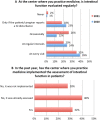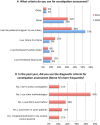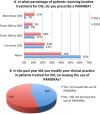Opioid-Induced Constipation in Real-World Practice: A Physician Survey, 1 Year Later
- PMID: 35122615
- PMCID: PMC9098716
- DOI: 10.1007/s40122-022-00354-4
Opioid-Induced Constipation in Real-World Practice: A Physician Survey, 1 Year Later
Abstract
Introduction: Opioid-induced constipation (OIC) is the most common adverse effect of opioid therapy, but it is underdiagnosed and undertreated. Last year, a survey among Italian healthcare providers revealed important differences in the clinical management of OIC across physician specialties, the need of standardization of diagnosis and treatment, and the urgency of further education. Herein, we submitted an updated version of the survey to the same cohort of experts to evaluate potential progress.
Methods: The online survey included 15 questions about OIC. Responses were analyzed descriptively and aggregated by physician specialty.
Results: A total of 190 physicians completed the survey. Most respondents (65%) did not feel adequately educated about OIC despite general consensus regarding interest in the topic and acknowledgement of OIC impact on patients' QoL and adherence to opioid therapy. Overall, 55-77% of physicians regularly evaluated intestinal function or OIC symptoms in patients receiving opioid therapy, with one-third of respondents implementing it in the past year. Even though the most common method for assessment was still patient diary, the use of specific scales underwent a small but significant increase compared to the previous year, with major implementation in the use of Rome IV criteria. As regards first-line treatment, most respondents (49%) preferred macrogol prophylaxis followed by macrogol plus another laxative. For second-line treatment, we revealed a growth in the prescription of peripherally acting mu-opioid receptor antagonists (PAMORAs), with 46% of all the respondents having increased their use during the past year.
Conclusions: Despite some limitations, our study demonstrated a slow but important step closer to standardization of diagnosis and treatment of OIC. Further educational and training efforts should be put in place to favor best evidence-based clinical practice.
Keywords: Chronic pain; Opioid; Opioid-induced constipation; PAMORAs.
© 2022. The Author(s).
Figures





References
LinkOut - more resources
Full Text Sources
Research Materials
Miscellaneous

